人教版英语必修三Unit1WarmingupReading
2021-2022学年高中英语人教版必修3习题:Unit 3 课时跟踪练(一) Word版含答案
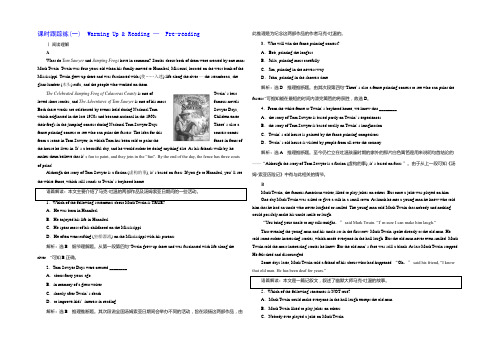
课时跟踪练(一) Warming Up & Reading — Pre-reading Ⅰ.阅读理解AWhat do Tom Sa w yer and Jumping Frogs have in common? Stories about both of them were created by one man: Mark Twain. Twain was four years old when his family moved to Hannibal, Missouri, located on the west bank of the Mississippi. Twain grew up there and was fascinated with (使……入迷) life along the river — the steamboats, the giant lumber (木头) rafts, and the people who worked on them.Twain's best The Celebrated Jumping Frog of Cala v eras County is one ofloved short stories, and The Ad v entures of Tom Sa w yer is one of his most famous novels. Both these works are celebrated by events held during National Tom Sawyer Days, which originated in the late 1950s and became national in the 1960s. Children enterThere's also a their frogs in the jumping contest during National Tom Sawyer Days.fence painting contest to see who can paint the fastest. The idea for this contest comes from a scene in Tom Sawyer, in which Tom has been told to paint the fence in front of the house he lives in. It's a beautiful day, and he would rather be doing anything else. As his friends walk by, he makes them believe that it's fun to paint, and they join in the “fun”. By the end of the day, the fence has three coatsof paint!Although the story of Tom Sawyer is a fiction (虚构的事), it's based on facts. If you go to Hannibal, you'll see the white fence, which still stands at Twain's boyhood home.语篇解读:本文主要介绍了马克·吐温的两部作品及汤姆索亚日期间的一些活动。
高中英语_unit 1 Warming up & Reading教学设计学情分析教材分析课后反思
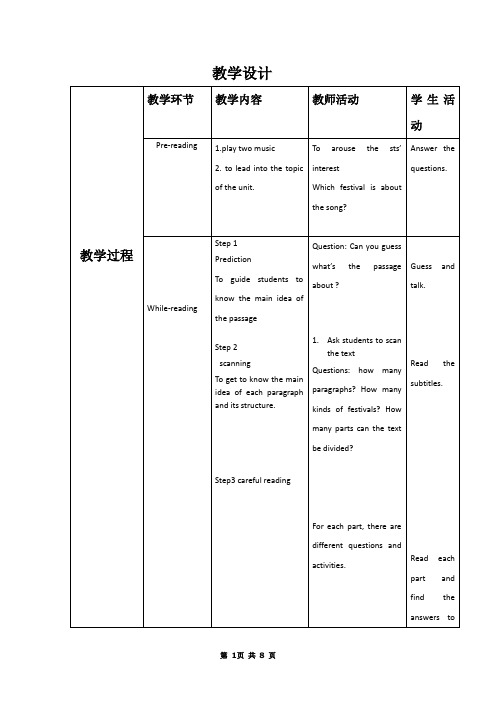
教学设计学情分析授课对象为高一年级学生。
从英语能力上讲,这个阶段的学生总体具有一定的英语基础,能够使用简单英语表达自己的想法,同时个体差异大,同班级学生学力往往参差不齐。
从性格上讲,高中学生比较成熟,对课堂质量要求比较高,不如初中学生容易调动。
从思想深度上讲,该年龄段学生,其人生观和价值观初步形成,对于事物有一定的批判性思考能力,同时,由于涉世未深,对事物的看法相对而言比较简单,思维的深度和广度有待加强。
具体到录课当天的情况:本次上课用的是自己班的学生,对学生的基本情况还是比较了解的,学生的英语水平底子并不好。
由于到新的录课教室,且学生刚上完体育课,时间匆忙,学生坐位随意,平时的讨论小组有打乱的情况,只好现场重新分组,对小组讨论产生了影响。
针对学生的精神状态和班级情况,我采取了以下对策:一、教学过程中多以低层次问题(如一般疑问句问题)开始提问,根据学生的反馈逐步提高问题难度;二、对于教学设计里较深层阅读任务的探讨性问题,适时根据学生的状态和回答进行追问,必要时给予范例和提示进行引导。
三、利用多媒体结合本课话题播放了有关节日的歌曲,以提高学生学习的兴趣。
利用让学生动手设计自己喜欢的节日,以提高学生讨论的兴趣。
录课现场授课时间规定为45分钟以内,教师对活动的安排必须准确到位,提高效率。
效果分析采用多媒体课件作为主要的教学手段。
多媒体课件可以将文字、图象、声音三者结合起来,更加活泼生动,易于为学生所接受,也能够更好地服务于教学。
同时,借助黑板、粉笔等辅助手段开展教学活动。
本课积极采用现代教育方法和手段,在课程教学时理论联系实际,教师在讲授时,运用多媒体课件、网络教学资源等现代化手段,制作教学图片、录像等多媒体课件资料,适时示范,提高了课堂教学效果。
本节阅读课,通过让学生了解中外节日的异同,通过阅读文章,引发对节日的思考对文化的喜欢。
从题材上来讲,让学生接触总分总结构的题材,并训练相关阅读技巧。
训练了学生用英语获取信息、处理信息、分析问题和解决问题的能力。
高中英语必修3(通用)课件:unit 5 第1课时Warming up Reading

5.海轮可以开到五大湖,这让两个女孩感到吃惊。 The girls ________________ ocean ships can sail up the Great Lakes.(be surprised at...对„„感到惊奇) 答案: 1.The thought that 2.Going eastward ; as well as
catch sight of 4.看见;瞥见 ________________ have a gift for 5.对„„有天赋 ________________ natural resources 6.自然资源 ________________
Unit 5
第一课时
成才之路 · 高中新课程 · 学习指导 · 人教版 · 英语 · 必修3 (通用本)
Unit 5
第一课时
成才之路 · 高中新课程 · 学习指导 · 人教版 · 英语 · 必修3 (通用本)
scenery (n.)景色;风景→________( scene 8.________ n.)情景;场景 eastward (adv.& adj.)向东;向东的→________( westward adv.& 9.________ upward adv.& adj.)向上地;向上的 adj.)向西;向西的→________( surround (vt.) 包围;围绕 → ___________( surrounding adj.) 周围的 10.________ surroundings n.)环境;周边事物 →____________( measure (vt.& vi.) 测 量 ; 衡 量 → ________( measure n.) 计 量 11 . ________ 制;计量单位;措施 slight (adj.) 轻微的;微小的 → ________( slightly adv.) 稍 12 . ________ 稍;轻微地
高中英语必修三unit1festival around the world warming and reading festivals and celebrations课件

……
Words about Spring Festival
Greeting Season
春节 The Spring Festival 农历 lunar calendar 除夕 New Year's Eve; eve of lunar New Year 初一 the beginning of New Year 元宵节 the Lantern Festival
Kinds of Festivals
Festivals of the Dead
Festivals to Honour People
Harvest Festivals
Spring Festivals
When did ancient people celebrate? Most ancient festivals would celebrate the end of______________, the cold weather ________________and planting in spring ____________________. Other celebrations harvest in autumn when hunters had caught animals were held _______________________________.
Teachers’ Day
Teacher’s Day is a day when we show respect to our teachers.
Festivals
高中英语(人教版 必修3)教师用书:Unit 1 Section_Ⅱ Warming Up - Re

人教版英语精品资料(精修版)Section_ⅡWarming Up & Reading — Language Points(一)根据英文释义和首字母提示写出单词1.award:to give something to somebody such as a prize or money for something they have done2.trick:_to make someone believe something that is not true3.gain:to get or achieve something, usually as a result of a lot of effort 4.gather:_to get, come or bring together5.starve:to suffer or die because you do not have enough to eat(二)用所给词的适当形式填空6.They celebrated his success and the celebration lasted four hours.(celebration)7.We believe in his ability, and the belief resulted from his behavior.(belief) 8.They gained independence in 1969, and now they are a proud and independent people.(independence)9.Agricultural development lies in the science of agriculture.(agriculture) 10.Auckland is a city full of energy,_where everyone seems energetic.(energetic)1.starve vi.& vt.(使)挨饿;饿得要死;(使)饿死vi.渴望;极需要★背诵佳句培养语感(教材原句)At that time people would starve if food was difficult to find, especially during the cold winter months.在那个时代,如果食物难以找到,特别是在寒冷的冬月,人们会挨饿。
高一英语必修3Unit1Festivals around the world-Warming up and readingPPT 课件

the Mid-autumn Festival China/Japan
the Spring Festival
China
Carnival
western countries
Easter
western countries
Cherry Blossom Festival Japan
Scanning
Answer the following questions:
ancestors back to home.
Obon
in Japan
When the festival is over, thousands of lanterns are placed into the water and they drift out to sea guiding the dead on their return journey to the other world.
What festivals can we find in each month?
Calendar
January February March
New Year Chinese New Year Women’s Day
Valentine's Day
Calendar
April
May
June
Easter
Columbus Day in the USA
in memory of the arrival of Christopher Columbus in America
Mahatma Gandhi Day
October 2 is a national festival in India to honour Mahatma Candhi
人教版英语必修1:Unit3 section ⅰ warming up & reading

Two years ago she bought an expensive mountain bike
and then she persuaded me to buy one.两年前,她买了一辆昂贵 的山地自行车,然后说服我也买了一辆。 4.persuade vt.说服;劝说 点拨 (1)persuade sb.to do sth. =persuade sb.into doing sth.
In order to know more information about the Mekong River, they went to the library to find a lot of good maps showing the
world geography.They were sure to finish the trip successfully.
到美国的飞机票价是多少? 辨析 fare/fee/charge (1)fare 指旅费,经常指乘坐交通工具的票价。 (2)fee 指酬金、入场/会费、专业服务或课程等的费用,指 定期支付的费用(尤指学费)时常用复数。 (3)charge 泛指各种费用、价钱。
运用 用上面所提供的辨析词的适当形式填空 charge ①Delivery is free of ________. ②I need some money for my bus________. fare
D.After graduating from college.
D 2.Who thinks Wang Wei is really stubborn?_______. A.Yu Hang. B.Dao Wei.
C.Wang Wei's cousins.
D.Wang Kun.
高中英语必修3(通用)课件:unit 4 第1课时Warming up Reading

4 .很多科学家相信,由于地球上长期有水存在,使地球
得以把有害气体和酸性物质溶解在海洋里。 ________________________________the continued presence of water allowed the earth to dissolve harmful gases and acids into the oceans and seas. (what主语从句+is that表语从句)
常用来表示不可避免将要发生的事情)
Unit 4 第一课时
成才之路 · 高中新课程 · 学习指导 · 人教版 · 英语 · 必修3 (通用本)
3 .水对于生命的发展起关键作用,这一点在当时并不明
显。 ________________________________water 明显) was to be fundamental to the development of life. (It is obvious that...„„很
Unit 4
第一课时
成才之路 · 高中新课程 · 学习指导 · 人教版 · 英语 · 必修3 (通用本)
religion n.)宗教,宗教信仰→________( religious adj.)宗教上的 9.________( violent adj.) 猛 烈 的 , 激 烈 的 ; 强 暴 的 10 . ________( violence n.)暴力→________( violently adv.)猛烈地;激烈地 →________( unlike prep.)不同;不像→________( like prep.)像 11.________( harmful adj.)有害的→________( harm n.)伤害;损害 12.________( exist vi.)存在;生存→________( existence n.)存在 13.________( puzzle vi.) 使迷惑;难题;谜 →________( puzzled adj.)迷惑 14.________( puzzling adj.)令人迷惑的 的→________(
【最新】人教版高中英语必修三课件:Unit+3+Section+Ⅱ+Warming+Up+&+Reading+—+Language+Points

一、这样记单词 记得准·写得对
Ⅰ.基础词汇 1. permit vt.&vi. n. 2. spot vt. n. 3. scene n. 许可;允许;准许 通行证;许可证;执照 发现;认出 斑点;污点;地点 (戏剧)一场;现场;场面;景色
认为;说明;总计有 说明;理由;计算;账目 凝视;盯着看 过错;缺点;故障 反面;对立面 相反的;相违的
Ⅱ.拓展词汇 1. penniless adj.身无分文的→penny n.分;便士 2. businessman n.商人→business n.生意;商业 3. unpaid adj.未付款的;不受报酬的→paid adj.付清的;已付的 4. patience n.耐心;耐性;忍耐→patient adj.有耐心的n.病人
on
the scene when the accident happened.
事故发生时,他在现场。 ③He is an important man behind the scenes. 他是一个幕后的重要人物。
[辨析比较]
scene, scenery, sight, view
指展现在眼前的情景,也可以指scenery的一部分,
do not I
that
引导表语
know
从句,只起连
anything about him.
接作用,不作 句子成分。
事实是我对他一无 所知。
1.(教材P17)He was brought up in Hannibal, Missouri, along the Mississippi River. 他生长在密西西比河畔密苏里州的汉尼拔市。 bring up 抚养;培养;教育;提出;呕吐
2021英语人教选修课件:Unit3 Ⅰ—WarmingUpPre-readingReading

从以上我们可以得出这一结论:工作越多越幸福,也越健康。
理解诱思 1.What is the best title for the text? A.People Should Find a Job B.Hard Work Is Good for Health C.People Should Make More Friends by Work D.The Loss of Work Means the Loss of Everythingthe text we can learn that
.
A.you can only become addicted to cigarettes in two different ways
B.smoking makes no difference in women becoming pregnant
C.if you have failed several times to stop smoking,you should feel
ashamed
D.you’d better not choose a stressful day to quit smoking
答案:D
一二三四五
4.In his girlfriend’s eyes,what kind of person was James’ grandfather?
一二三四五
五、下面是课文原文的浓缩,仔细阅读并根据课文内容将其补充完
整
James’ grandfather is told that James started smoking some time
2021-2022学年人教版高中英语必修三练习:Unit 1 课时跟踪练(一) Word版含解析
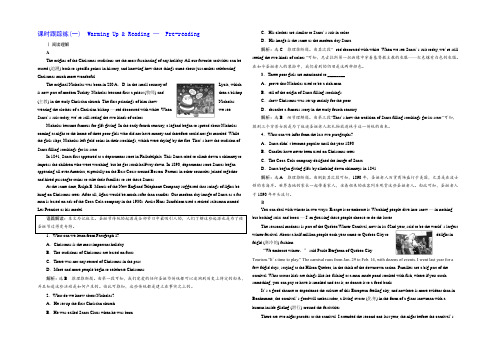
课时跟踪练(一) Warming Up & Reading — Pre-reading Ⅰ.阅读理解AThe origins of the Christmas traditions are the most fascinating of any holiday. All our favorite activities can be traced (追溯) back to specific points in history, and knowing how these things came about just makes celebrating Christmas much more wonderful.The original Nicholas was born in 280 A.D. in the small country of Lycia, which is now part of modern Turkey. Nicholas became first a priest (牧师) and then a bishop (主教) in the early Christian church. The first paintings of him show Nicholas wearing the clothes of a Christian bishop — red decorated with white. When we see Santa's suit today, we're still seeing the two kinds of colors.Nicholas became famous for gift-giving. In the early fourth century, a legend began to spread about Nicholas coming at night to the home of three poor girls who did not have money and therefore could not get married. While the girls slept, Nicholas left gold coins in their stockings, which were drying by the fire. That's how the tradition of Santa filling stockings got its start.In 1841, Santa first appeared at a department store in Philadelphia. This Santa tried to climb down a chimney to impress the children who were watching, but he got stuck halfway down. In 1890, department store Santas began appearing all over America, especially on the East Coast around Boston. Parents in other countries joined together and hired passenger trains to take their families to see these Santas.At the same time, Ralph E. Morris of the New England Telephone Company suggested that strings of lights be hung on Christmas trees. After all, lights would be much safer than candles. Our modern-day image of Santa as a fat man is based on ads of the Coca-Cola company in the 1930s. Artist Hans Sundblom used a retired salesman named Les Prentice as his model.语篇解读:本文为记叙文。
人教新课标高中英语必修三Unit 1 Festivals around the world全章教案

人教新课标高中英语必修三Unit 1 Festivals around the world全章教案I.教学内容分析本单元的中心话题是“节日”,主要讲述了不同地区不同种类的节日。
Warming Up部分设计了小组活动,通过图表填写让学生区分中国的传统节日与别国节日的异同,目的在于激活学生已有的节日背景知识,引出主题,为以后几堂课学习热身。
Pre-reading 通过几个问题,调动学生已有的知识和经验,激发学生想了解更多节日的好奇心,让他们主动参与到主题教学活动中,为下面学习阅读文章作铺垫。
Reading 部分先简要介绍了一下早期各种节日的起源以及存在的原因,然后又分别介绍了几种世界各地的节日,依次的顺序是亡灵节、纪念名人的节日、丰收节、春天的节日等。
Comprehending由四个部分组成。
第一、三、四部分通过表格形式,第二部分通过让学生回答问题的方式,鼓励学生积极思考,加深对课文的理解。
Learning about Language 部分主要突出了本单元的语法项目——情态动词的用法。
这些情态动词主要有:can,could,may,might,will,would,shall,should,must,can’t 等的用法。
Using Language 部分中包括了听、说、读、写几个部分的内容。
学生可通过对Trinidad Carnival、情人节等一些节日的学习,分析问题,锻炼自己的思维能力。
阅读后的习题及讨论不仅帮助学生理解文章的主旨大意,更重要的是让学生寻找解决问题的方法。
Learning Tip部分主要建议学生搜集各种资料,查询与世界各地节日有关的信息,了解各种节日的来源与内涵。
II.教学重点和难点1. 教学重点(1) 本单元的生词和短语;(2) 掌握一些情态动词的基本用法;(3) 了解有关节日和民俗,掌握有关词汇,如custom,religious等。
2. 教学难点(1) 增进学生对中国节日的理解,了解和感悟外国的节日;(2) 提高学生的社会文化素质,加强跨国文化素质;(3) 培养学生运用资源策略。
2019-2020学年高中人教版英语必修三课时作业:Unit 1 Festivals around the world Section Ⅱ Word版含答案
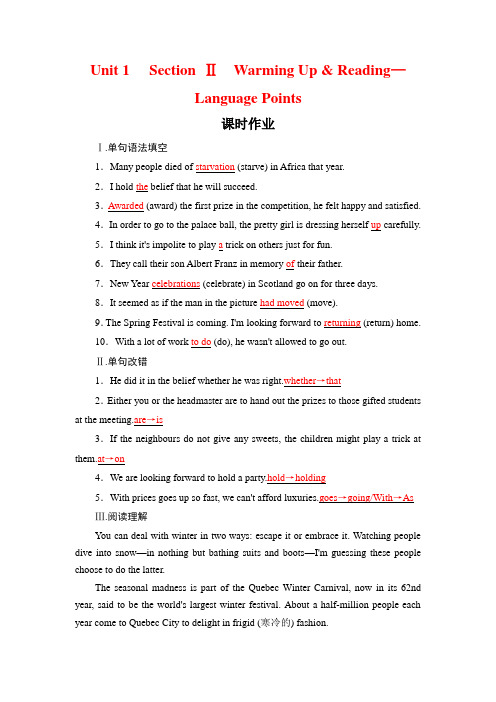
Unit 1Section ⅡWarming Up & Reading—Language Points课时作业Ⅰ.单句语法填空1.Many people died of starvation (starve) in Africa that year.2.I hold the belief that he will succeed.3.Awarded (award) the first prize in the competition, he felt happy and satisfied.4.In order to go to the palace ball, the pretty girl is dressing herself up carefully.5.I think it's impolite to play a trick on others just for fun.6.They call their son Albert Franz in memory of their father.7.New Year celebrations (celebrate) in Scotland go on for three days.8.It seemed as if the man in the picture had moved (move).9.The Spring Festival is coming. I'm looking forward to returning (return) home.10.With a lot of work to do (do), he wasn't allowed to go out.Ⅱ.单句改错1.He did it in the belief whether he was right.whether→that2.Either you or the headmaster are to hand out the prizes to those gifted students at the meeting.are→is3.If the neighbours do not give any sweets, the children might play a trick at them.at→on4.We are looking forward to hold a party.hold→holding5.With prices goes up so fast, we can't afford luxuries.goes→going/With→As Ⅲ.阅读理解You can deal with winter in two ways: escape it or embrace it. Watching people dive into snow—in nothing but bathing suits and boots—I'm guessing these people choose to do the latter.The seasonal madness is part of the Quebec Winter Carnival, now in its 62nd year, said to be the world's largest winter festival. About a half-million people each year come to Quebec City to delight in frigid (寒冷的) fashion.“We embrace winter,”said Paule Bergeron of Quebec City Tourism.“It's time to play.” The carnival runs from Jan. 29 to Feb. 14, with dozens of events. I went last year for a few frigid days, staying at the Hilton Quebec, in the thick of the downtown action. Families are a big part of the carnival. What attract kids are things like ice-fishing at a man-made pond stocked with fish, where if you catch something, you can pay to have it smoked and eat it, or donate it to a food bank.It's a good chance to experience the culture of this European-feeling city, and nowhere is more evident than in Bonhomme, the carnival's goodwill ambassador, a living avatar (化身) in the form of a giant snowman with a human inside gliding (滑行) around the festivities.There are two night parades at the carnival. I attended the second one last year, the night before the carnival's close. The streets were lined with thousands of people in a gentle snow and bitter cold, watching local dancers and school groups glide by. In the end, Bonhomme's float came into view, and kids in the crowd went crazy. As the parade ended, thousands followed behind it, becoming part of the Quebec Winter Carnival's magic and madness. And with a cup of milk in my hand, I realized that for once, not only did I not mind winter, I embraced it.【解题导语】本文为说明文。
人教版高中英语必修3人教版必修三Unit1Festivals around the world教案Period 1 Warming up and Reading
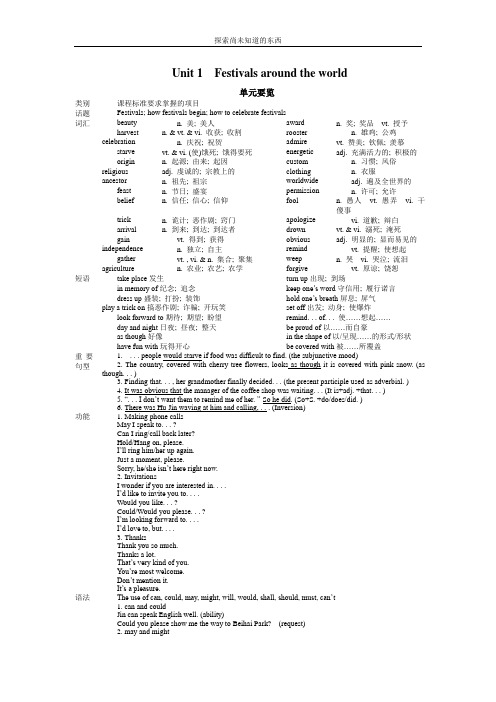
Unit 1Festivals around the world单元要览类别课程标准要求掌握的项目话题Festivals; how festivals begin; how to celebrate festivals词汇beauty n. 美; 美人award n. 奖; 奖品vt. 授予harvest n. & vt. & vi. 收获; 收割rooster n. 雄鸡; 公鸡celebration n. 庆祝; 祝贺admire vt. 赞美; 钦佩; 羡慕starve vt. & vi. (使)饿死; 饿得要死energetic adj. 充满活力的; 积极的origin n. 起源; 由来; 起因custom n. 习惯; 风俗religious adj. 虔诚的; 宗教上的clothing n. 衣服ancestor n. 祖先; 祖宗worldwide adj. 遍及全世界的feast n. 节日; 盛宴permission n. 许可; 允许belief n. 信任; 信心; 信仰fool n. 愚人vt. 愚弄vi. 干傻事trick n. 诡计; 恶作剧; 窍门apologize vi. 道歉; 辩白arrival n. 到来; 到达; 到达者drown vt. & vi. 溺死; 淹死gain vt. 得到; 获得obvious adj. 明显的; 显而易见的independence n. 独立; 自主remind vt. 提醒; 使想起gather vt. , vi. & n. 集合; 聚集weep n. 哭vi. 哭泣; 流泪agriculture n. 农业; 农艺; 农学forgive vt. 原谅; 饶恕短语take place发生turn up出现; 到场in memory of纪念; 追念keep one’s word守信用; 履行诺言dress up盛装; 打扮; 装饰hold one’s breath屏息; 屏气play a trick on搞恶作剧; 诈骗; 开玩笑set off出发; 动身; 使爆炸look forward to期待; 期望; 盼望remind. . . of. . . 使……想起……day and night日夜; 昼夜; 整天be proud of以……而自豪as though好像in the shape of以/呈现……的形式/形状have fun with玩得开心be covered with被……所覆盖重要句型1. . . . people would starve if food was difficult to find. (the subjunctive mood)2. The country, covered with cherry tree flowers, looks as though it is covered with pink snow. (as though. . . )3. Finding that. . . , her grandmother finally decided. . . (the present participle used as adverbial. )4. It was obvious that the manager of the coffee shop was waiting. . . (It is+adj. +that. . . )5. “. . . I don’t want them to remind me of her. ” So he did. (So+S. +do/does/did. )6. There was Hu Jin waving at him and calling, . . . (Inversion)功能 1. Making phone callsMay I speak to. . . ?Can I ring/call back later?Hold/Hang on, please.I’ll ring him/her up again.Just a moment, please.Sorry, he/she isn’t here right now.2. InvitationsI wonder if you are interested in. . . .I’d like to invite you to. . . .Would you like. . . ?Could/Would you please. . . ?I’m looking forward to. . . .I’d love to, but. . . .3. ThanksThank you so much.Thanks a lot.That’s very kind of you.You’re most welcome.Don’t mention it.It’s a pleasure.语法The use of can, could, may, might, will, would, shall, should, must, can’t1. can and couldJin can speak English well. (ability)Could you please show me the way to Beihai Park? (request)2. may and mightMay we see the awards for the teams? (permission; request)She might give you some new clothing. (possibility)3. will and wouldThe Spring Festival is the most fun. The whole family will come for dinner. (promise; agreement) Often he would dress up like a rich man. (past habit; custom)4. shall and shouldThe harvest festival begins on Sunday. We shall be there with our friends. (promise; agreement) You should arrive at the airport two hours before he goes. (advice)5. must and can’tWang Feng wins an award every year. He must be very strong. (speculation)You must be joking. That can’t be true. (guessing)教学重点1. Get students to know about festivals around the world.2. Have students learn some useful new words and expressions about festivals and customs and let them learn effective ways to remember English vocabulary.3. Enable students to grasp and use the expressions of request and thanks.4. Let students learn the new grammar item: the use of can, could, may, might, will, would, shall, should, must and can’t.5. Develop students’ listening, speaking, reading and writing abilities.教学难点1. Enable students to master the use of can, could, may, might, will, would, shall, should, must and can’t.2. Let students learn to write a different ending of a story.3. Develop students’ integrative skills.课时安排Periods needed: 7Period 1 Warming up and readingPeriod 2 Learning about language: Important language points Period 3 Learning about language: GrammarPeriod 4 Using language: Listening and speakingPeriod 5 Using language: Extensive readingPeriod 6 Using language: Speaking and writingPeriod 7 Revision: Summing up and learning tipPeriod 1Warming up and reading整体设计教材分析This is the first teaching period of this unit. At the beginning of the class, the teacher can lead in the topic of the unit by having a free talk with students about their winter holidays and the Spring Festival.The Warming Up is intended to have students start thinking about the variety of events and festivals that are celebrated in China, and connect them with seasons of the year and reasons for the celebrations. The teacher can use this part to introduce information that Chinese students should have about their country’s cultural events.The Pre-reading is a continuation of the Warming Up and it moves the discussion to a more personal level. It is intended to help students enter imaginatively into a discussion of festivals and their importance to the society. It also directs their attention to the variety of events and activities those festivals include. The teacher should let students discuss the questions and predict what kind of information will be introduced in the Reading.The reading passage titled FESTIV ALS AND CELEBRATIONS briefly describes the earliest kinds of festivals with the reasons for them, and then four different kinds of festivals that occur in most parts of the world. Encourage students to look at the pictures and the heading of each section to guess what the text might be about. Then let them skim for the general idea for each section, and scan for further understanding. Because this passage introduces a lot of useful new words and expressions which are only used for festivals, in order not to let students feel much difficult, the teacher should deal with any language problems while they are reading. After reading, students are required to do the four exercises in the Comprehending to see how much they have understoodthe reading passage. The teacher can first let them work in pairs or in groups to find the answers cooperatively, and then check their answers with the whole class.To consolidate the contents of the reading passage, students should be required to talk about festivals in their own words at the end of the class. In order to arouse students’ interest, the teacher can hold a competition between groups.教学重点1. Let students learn more about history and basic knowledge of festivals.2. Get students to learn different reading skills.教学难点1. Develop students’ reading ability.2. Enable students to talk about festivals and celebrations.三维目标知识目标1. Get students to learn the useful new words and expressions in this part: beauty, harvest, starve, origin, religious, ancestor, Mexico, feast, bone, belief, poet, arrival, gain, independence, gather, agriculture, award, rooster, admire, energetic, Easter, clothing, Christian, custom, take place, in memory of, dress up, play a trick on, look forward to, day and night, as though, have fun with2. Let students learn about history and basic knowledge of festivals both in and out of China.能力目标1. Develop students’ reading ability and let them learn different reading skills.2. Enable students to talk about festivals and celebrations.情感目标1. Stimulate students’ love for their own national culture and customs.2. Develop students’ sense of cooperative learning.教学过程设计方案(一)→Step 1 Leading-inHave a free talk with students. Ask them the following questions:Did you have a good time in your winter holidays?When did you feel most happy and excited? Why?(At the Spring Festival. Because it’s the most important festival in our country. . . )→Step 2 Warming up1. Let students brainstorm the other Chinese festivals.(Lantern Festival, Pure Brightness Festival, Dragon Boat Festival, Mid-Autumn Festival, New Year’s Day, Chung Yeung Festival. . . )2. Let students read the information about Chinese festivals below and discuss another three Chinese festivals:When does the festival come?What do people celebrate?What do people do?Festivals Date Festivals DateNew Year January 1st Teachers’ Day September 10thInternational Women’sDayMarch 8th National Day October 1stArbor Day March 12th The Spring Festival Lunar New YearInternational Labor Day May 1st Dragon Boat Festival the fifth day of the fifth lunar month International Children’sDayJune 1st Mid-Autumn Festival the 15th day of the 8th lunar month Army Day August 1st Lantern Festival the 15th day of the 1st lunar month Chinese Youth Day May 4th Pure Brightness Day April the fifth3. Ask students to fill in the following form and ask some to share their opinions with the whole class. The first one is given as an example.Festivals Time of year/date What it celebrates What people doMid-Autumn Festival autumn/fall the beauty of the fullmoon, harvest, time withfamily and friends give/eat moon cakes and watch the full moon with family and friends4. Talk about some foreign festivals with students.(Christmas, April Fools’ Day, Easter, Halloween, Valentine’s Day, Thanksgiving Day, . . . )→Step 3 Pre-reading1. Let students discuss the following questions:What festivals or celebrations do you have in your city or town? What part of a festival do you like best—the activities, the music, the sights, the food or the people who visit?2. Ask students to look at the pictures and title of the passage in Reading. Discuss in pairs what kind of information will be introduced in the passage.→Step 4 Reading1. Fast readingAsk students to skim the reading passage and then fill in the following chart.Kinds of Festivals Names of Festivals Countries FestivalsFestivalsHarvestSpring(Let students look through the chart and then read the text silently. Three minutes later, check the answers with the whole class. Show the suggested answers on the screen. )2. Intensive readingAllow students to read carefully this time to understand the main ideas of each paragraph and the important details, and then finish the following:1)Choose the best answer to each question or to finish each sentence according to the text.(1)Why do Japanese people light lamps during the Festival of the Dead?A. Because they want to make the festival colorful.B. Because they want to light up their rooms.C. Because they want to light up their way.D. Because they want to lead their ancestors to return to earth.(2)Which of the following was not mentioned as a famous person in the text?A. Mohandas Gandi.B. Christopher Columbus.C. Abraham Lincoln.D. Qu Yuan.(3)The place where people will usually decorate churches and town halls with flowers andfruits is ______________.A. IndiaB. AmericaC. EuropeD. China(4)Easter is held in memory of the return of Jesus for Christians and also celebrates ______________.A. the coming of springB. the autumn harvestC. the Lunar New YearD. the end of a yearSuggested answers: (1)D(2)C(3)C(4)A2)Use the information from the reading passage to answer the following questions.(1)What are festivals of the dead usually for?(2)What makes autumn festivals happy events?(3)What do people usually do at spring festivals?(4)What is one important reason to have festivals and celebrations?(5)Compare the festivals of the dead in Mexico, Japan and China. What things are similar? What things are different?3. Reading and discussionRead the text a third time and then work in pairs to do the following.1)Based on the reading passage, what do most festivals seem to have in common? Why do you think these things might be important to people everywhere? Talk with your partner and fill in the chart below.Three common things Reasons why they are important to people everywhere1.2.3.2)Discuss in pairs which festivals you think are the most important and which are the most fun. Then fill in the chart with your ideas.Type of festival Example of festival Reasons for your choice Most importantMost fun(Let students have enough time to read the passage carefully and discuss the questions and charts with their partners. Encourage them to expand their answers according to their own experiences. )4. ExplanationHelp students analyze some difficult, long and complex sentences and guess the meanings of some new words. Encourage them to try to deal with the language points in the context.Discuss the following important sentences and phrases in the passage.1)Some festivals are held to honour the dead, or to satisfy the ancestors, who might return either to help or to do harm.2)in memory of3)India has a national festival on October 2 to honour Mohandas Gandhi, the leader who helped gain India’s independence from Britain.4)People are grateful because their food is gathered for the winter and the agricultural work is over.5)The most energetic and important festivals are the ones that look forward to the end of winter and to the coming of spring.6)The country, covered with cherry tree flowers, looks as though it is covered with pink snow.Suggested explanations:1)The sentence contains a non-restrictive attributive clause who might return either to help or to do harm. It means people hold some festivals either to show respect to the dead or to make their ancestors happy in case they might come back to do harm.2)in memory of: serving to recall sb. , to keep him fresh in people’s mindsHe wrote a poem in memory of his dearest wife, who died in an accident.in honor of: showing great respect or high public regard3)the leader who helped gain India’s independence from Britain: a noun phrase followed by an attributive clause as the appositive4)two clauses for reason5)energy n. → energetic adj. : full of or done with energylook forward to: “to” is a preposition here.I’m looking forward to hearing from you.be devoted to; be/get used to; get down to; stick to. . .6)covered with cherry tree flowers: a past participle phrase equal to “which is covered with cherry tree flowers”as though: as ifHe talks as though he knew all about it.He looks as if he had seen a ghost.5. Reading aloud and underliningAsk students to read the passage aloud to the tape and let them pay attention to the pronunciation of each new word and the pauses within each sentence. Tell them to pick out all the useful expressions or collocations from the passage while reading and copy them to the notebook after class as homework.→Step 5 ConsolidationAsk students to talk about festivals in their own words according to the text. Then let them complete the following passage with proper words or phrases.There are all kinds of festivals and ______________ around the world, which are held for different ______________. The ancient festivals were mainly held at three times a year—the end of the cold ______________, planting in spring and ______________ in autumn. Some festivals are held to ______________ the dead or ______________ the ancestors, who might return either to help or ______________, while other festivals are held to honor famous people or to the ______________, such as Dragon Boat Festival, Columbus Day, and so on. Harvest and ______________ festivals are happy events because their food is ______________ for the winter and the ______________ work is over, to which Mid Autumn Festival belongs. And the most ______________ and important festivals are the ones that ______________ the end of winter and to the coming of ______________ such as the Lunar New Year, at which people have a very ______________.Suggested answers: celebrations; reasons; weather; harvest; honor; to satisfy; to do harm; gods; Thanksgiving; gathered; agricultural; energetic; look forward to; spring; good time→Step 6 Homework1. Learn the useful new words and expressions in this part by heart.2. Read the reading passage again and again and try to talk about festivals both in and out of China.设计方案(二)→Step 1 Leading in the topic by learning vocabulary about festivals1. Make a circle on the blackboard and write the word “FESTIV AL” in it.2. Ask students, “We have learned ‘festival’. Can you name some festivals? ”3. Students list as many fest ivals as possible. Then the teacher adds some students can’t think of, such as Halloween, Easter, Thanksgiving, Valentine’s Day.4. Let students read them aloud and try to learn them by heart.→Step 2 Warming up by talking about festivalsWork in groups and list three more Chinese festivals that you know. Discuss when they take place, what they celebrate and what people do at that time. Then tell the group which festival is their favorite and why.Festivals Time of year/date What it celebrates What people doMid-Autumn Festival autumn/fall the beauty of the fullmoon, harvest, time withfamily and friends give/eat moon cakes and watch the full moon with family and friends→Step 3 Predicting by looking and discussing1. Look at the pictures and title of the reading passage and discuss in pairs what the passage might be about.2. Two or three students are to give their opinions.→Step 4 Reading1. Give students 2 minutes, and ask them to skim the passage for information to tell if the following sentences are True or False.1)The ancient people needn’t worry about their food. (F)2)Halloween used to be a festival intended to honor the dead. (T)3)Qu Yuan was a great poet who people honor a lot in China. (T)4)The Mid-autumn Festival is held to celebrate the end of autumn. (F)5)Easter celebrates the birth of Jesus. (F)2. Give students 5 minutes to read the passage carefully, and complete the chart according to the passage.Festivals of the Dead Obon in Japan___________________HalloweenFestivals to Honor People ________________________________A national festival in____________Harvest Festivals _________ in European countries_________ in China and JapanSpring Festivals ________________Carnivals in some Western countries________________________________ in Japan3. Listening and reading aloudPlay the tape of the text for students and let them pay attention to the pronunciation of each new word and the pauses within each sentence. Then ask them to read the text aloud to the tape.→Step 5 Closing down by spoken practice1. Have students get prepared in 3 minutes or so and then ask them to talk about festivals and celebrations.2. Ask as many students as possible to have a try in front of the class.→Step 6 Homework1. Go over the text and try to learn all the useful words and expressions in this part by heart.2. Finish the exercises in Comprehending on Page3.板书设计Unit 1Festivals around the worldFestivals and celebrationsKinds of Festivals Names of Festivals Countries FestivalsFestivalsHarvestSpring活动与探究Group discussion & speechAs is known from the reading passage, festivals of all kinds are celebrated around the world. Most festivals have celebrations that include food, music, clothing and dances. These events originated from some similar ideas, but they take different forms in different regions and societies. What festivals and celebrations do you know all over the world? Have you ever taken part in them and enjoyed yourself? Discuss festivals in groups and then make speeches.Step 1: The teacher divides the class into four groups and gives the tasks to students in each group. Group 1 will list the festivals around the world as many as possible, and then categorize them according to the origins of these festivals. And they should prepare for a short speech. Group 2 will discuss two traditional Chinese festivals and prepare for their presentation. Group 3 will discuss two Western festivals and prepare for their presentation. Group 4 will discuss the differences between Chinese festivals and Western festivals, then contrast and compare their styles, celebrations, dates and so on. And they should prepare for a short speech.Step 2: Groups 1, 2 and 3 give their speeches on the festivals they have discussed. Group 4 gives their speech on the differences between Chinese festivals and Western festivals.Step 3: The teacher makes proper remarks about students’ speeches and sums up the different cultural practices between China and other countries according to them.。
高中英语必修3(通用)课件:unit 3 第1课时Warming up Reading

忍的
Unit 3
第一课时
成才之路 · 高中新课程 · 学习指导 · 人教版 · 英语 · 必修3 (通用本)
Ⅱ.短语互译 bring up 1.抚养;培养;教育;提出 ________________
go ahead 2.前进;(用于祈使句)可以;往下说 _________ by accident 3.偶然;无意中;不小心 ________________ stare at 4.盯着看;凝视 ________________ 导致;做出解释 5.account for ________________ 与此相反;正相反 6.on the contrary ________________ 关心 7.care about ________________ 老实说 8.to be honest ________________
课前新知预习
Unit 3
第一课时
成才之路 · 高中新课程 · 学习指导 · 人教版 · 英语 · 必修3 (通用本)
Ⅰ.单词速记 phrase n.)短 Nhomakorabea;词组;惯用语 1.________(
wander vi.)漫游;漫步;漂泊 2.________( ahead adv.)在前;向前;提前 3.________( stare vi.)凝视;盯着看 4.________( fault 5.________( n.)过错;缺点;故障 spot vt.)发现;认出 (n.)斑点;污点;地点 6.________( passage n.)船费(包括食宿);通道;(一)段 7.________( account vi.& vt.)认为;说明;总计有 (n.)说明;理 8.________( 由;计算;账目
人教版高中英语必修3Unit3知识点详解

Part 1. Warming up1.He was brought up in Hannibal,Missouri,along the Mississippi River.他在密西西比河边的密苏里州的汉尼拔长大。
bring up 抚养;培养;教育;提出;呕吐;He left her to bring up the three young children on her own.(抚养)I shall bring up this question at the next meeting. (提出) He was so sick that hebrought up everything.(呕吐)In my day, children were brought up to respect the law. (教育)拓展:bring about 引起;致使;造成;达成bring along/on 带来bring back 使记起;归还;恢复bring down 使减低;降低;挫伤(傲气)bring forth 产生;产出;生产bring forward 提出;出示;展示bring out 揭露;显示,解释;出版bring to (oneself) 使复苏bring in 引进;引来;赚得巧学助记:The plan he brought up has brought down the cost of production and brought in a lot of profit, which brought the company back to life.他提出的方案降低了成本,带来了大量利润,使公司恢复了生机。
①Can you make a sentence to bring out the meaning of the phrase?你能造个句子来讲清楚这个短语的意思吗?②The fine weather is bringing the crops on nicely.这样的好天气使庄稼更加茁壮成长。
高中英语课件 人教版必修三 Unit 1festivals around the world课件
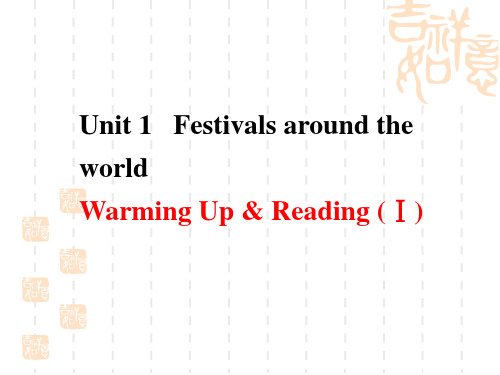
5. Compare the festivals of the dead in Mexico, Japan and China. What things are similar? What things are different?
The Chinese, Japanese and Mexican festivals of the dead all have customs to honor the dead. The Chinese and Japanese go to clean their ancestors’ graves, and the Mexicans offer food, flowers and gifts to the dead. However, there are some differences. The Mexicans eat special food that looks like bones, something the Chinese and
Harvest Festivals Spring Festivals
Festivals
Festivals of the Dead
Festivals to Honour People
Names of
Countries
FesOtibvoanls
Japan
Mexico
Day of the Dead some
they
Festival
might d__ _______, while other festivals are held to
Discussion
My favourite • Whfaet iss ytoiuvrafalvorite festival?
高中英语必修3(通用)课件:unit 1 第1课时Warming up Reading

课前新知预习
Unit 1
第一课时
成才之路 · 高中新课程 · 学习指导 · 人教版 · 英语 · 必修3 (通用本)
Ⅰ.单词速记 harvest n. & vt. & vi.)收获;收割 1.________(
starve v.)(使)饿死;饿得要死 2.________( religious adj.)宗教上的;信奉宗教的 3.________( belief n.)信任;信心;信仰 4.________( gain 5.________( vt.)获得;得到 gather vt.& vi.& n.)搜集;集合;聚集 6.________( award n.)奖;奖品(vt.)授予;判定 7.________( admire vt.)钦佩;赞美;羡慕 8.________(
(either...or...要么„„要么„„;或者„„或者„„)
Unit 1 第一课时
成才之路 · 高中新课程 · 学习指导 · 人教版 · 英语 · 必修3 (通用本)
3 .在这个重要的节庆日子里,人们会吃制成颅骨形状的 食物,和装点有“骨头”的蛋糕。 On this important feast day,people eat food in the shape of
成才之路 · 高中新课程 · 学习指导 · 人教版 · 英语 · 必修3 (通用本)
Ⅱ.短语互译
1.take place
发生 _______
纪念;追念 2.in memory of ________________ 3.dress up 盛装;打扮;装饰 ________________ 4.play a trick on 搞恶作剧,开玩笑 ________________ look forward to 5.期望;期待 ________________ day and night 6.日夜,昼夜 ________________ as though 7.好像 ________________ have fun with 8.玩得开心 ________________
【步步高】2020-2021高中英语Unit3AtasteofEnglishhumourPeriod

【步步高】20212021高中英语Unit3AtasteofEnglishhumourPeriodWarmingUpRead ing同步测试1新人教版必修3Period One Warming Up & Reading(Ⅰ)基础落实Ⅰ.课文明白得1.Charlie Chaplin could make the audience laugh because ________.A.he is goodlookingB.he acted in the films by using nonverbal humourC.the films at that time were silentD.he played a poor and homeless person2.The Gold Rush was set in ________.A.Britain B.AmericaC.Canada D.Australia3.Where did Chaplin die?A.In America. B.In England.C.In Switzerland. D.In Sweden.4.Which of the following statements is TRUE according to the text?A.Humour is always kind.B.All actors can astonish us with the deep feelings for a character they are playing.C.Charlie Chaplin went to California in search of gold with his friend in the middle of the 20th century.D.Charlie Chaplin was given an honour for his contribution to the film industry. 5.The writer describes how Charlie Chaplin ate a pair of shoes to ________.A.offer more details about the film The Gold RushB.give an example how Charlie Chaplin acted in the film by using nonverbal humour C.describe how Charlie Chaplin and his friend were unfortunateD.tell the readers how difficult it was to search for goldⅡ.课文缩写Charlie Chaplin was a master of 1.________.In Britain and America people were feeling 2.________ because of the bad economic situation and wars.Charlie understood their problems and brightened their lives through the hard times,so they could feel 3.________ with their lives.Actually,Charlie was born in a poor family and showed an 4.________ talent as a performer.5.________,his father died young,leaving his family even worse 6.________.In his teens,he could act the fool doing 7.________ everyday tasks,whom no one was 8.________ ter on,Chaplin directed,produced and starred in a series of funny movies.The little tramp,who was a poor,homeless man with a moustache,large trousers, wornout shoes and a small round black hat,was one of the most famous parts he had ever played and this character made Charlie well known 9.________ the world.In 1972,he was given a special Oscar for his 10.________ work in films.He is loved and remembered as a great actor who could inspire people with great confidence.Ⅲ.介、副词填空1.He brightened the lives ________ Americans and British ________ two world wars and the hard years ________ between.2.________ his teens,Charlie had,________ his humour,become one of the most popular child actors in England.3.He grew more and more popular as his charming character,the little tramp,became known ________ the world.4.He walked ________ stiffly carrying a walking stick.5.Here is an example ________ one of his most famous films,The Gold Rush. 6.________ so many others,the little tramp has rushed there in search ________ gold,but ________ success.7.Instead he and another man are hiding in a small hut ________ a snowstorm ________ nothing to eat.8.The acting is ________ convincing that it makes you believe that it is one of the best meals he has ever tasted.9.Charlie Chaplin wrote,directed and produced the films he starred ________. 10.He is loved and remembered ________ a great actor who could inspire people ________ great confidence.Ⅳ.用所给词的适当形式填空1.______________ (fortunate),she managed to pass the exam at the second attempt. 2.I d on’t know if ________ (boil)water can kill these worms.3.All of them were lost in the ____________ (entertain)story.4.She didn’t go home but went ________ (direct)to the hospital.5.To my great ______________ (astonish),she didn’t marry him.6.The students in our school study very hard,____________ (particular)those in our class.7.He went outside to take a ________ (mouth)of fresh air.8.Because of ________ (poor),he couldn’t afford to go to school.9.He ________ (wear)out two pairs of shoes last year.10.I started to eat too much out of sheer ________ (bored).Ⅴ.完成句子1.He made people laugh ________________ they felt depressed,so they could feel more ______________ their lives.在感到沮丧的时候,他能够使他们开怀大笑,因此人们就对自己的生活感到比较满足。
- 1、下载文档前请自行甄别文档内容的完整性,平台不提供额外的编辑、内容补充、找答案等附加服务。
- 2、"仅部分预览"的文档,不可在线预览部分如存在完整性等问题,可反馈申请退款(可完整预览的文档不适用该条件!)。
- 3、如文档侵犯您的权益,请联系客服反馈,我们会尽快为您处理(人工客服工作时间:9:00-18:30)。
8. in memory of …纪念,追念… in honor of ….为了纪念,尊敬…
为了纪念周总理,人们写下许多诗篇。
People wrote many poems in memory of Premier Zhou.
Fast reading
Origins of festivals Para.1
starve to death starve oneself to lose weight die of starvation
6. origin n. 起源
the origin of life
生命的起源
7. religious adj. religious belief religion n. 宗教 the Christian religion
National Day October 1st
October 31st
pumpkin head
mask
Halloween in Western countries
Thanks Giving Day
感恩节 the fourth thursday in November
Christmas December 25th
the third Sunday in June
Qiqiao Festival
August 1st
The Army Day
Teachers’ Day September 10th
Middle-Autumn Day
the Double-Ninth Festival 重阳节
The 9th day of the 9th lunar month
around March 22---April 25
复活节(Easter),是纪念耶稣基督复活
的节日,西方信基督教的国家都过这个节。在 西方教会传统里,春分之后第一次满月之后的 第一个星期日即为复活节。东方教会则规定, 如果满月恰逢星期日,则复活节再推迟一周。 因此,节期大致在3月22日至4月25日之间。复 活节是最古老最有意义的基督教节日之一,庆 祝的是基督的复活,世界各地的基督徒每年都 要举行庆祝。复活节还象征重生和希望。你能 算出2014年的复活节是jiyuejihao?
庆祝严寒结束,春播秋收 Most ancient festivals would celebrate the end of the _c_o_ld_ w__e_a_th_e_r_, planting in _sp__ri_n_g_ and harvest in _a_u_tu__m_n_. Today’s festivals have many o_r_i_g_in_s_, some _r_e_li_g_io_u__s , some _se_a_s_o_n_a_l__and some for special _p_e_o_p_le_ or _e_v_e_n_ts_.
2. beauty n. 美,美人
beautiful adj. 美丽的
eg. Hepburn is a beauty. Hepburn is beautiful.
Audrey Hepburn
3. harvest 收获,收割
unexpected harvest 意外的收获 the harvest season 收获的季节
• lucky money in red paper (压岁钱)
• let off firecrackers (放鞭炮)
• a get-together feast (团圆饭)
• ……
元宵节习俗: eat yuanxiao and rice cake guess lantern riddles watch fireworks 看烟火
New words
1. take place 发生
happen 发生
break out 爆发
eg. The wedding will take place tomorrow. The Second World war broke out in 1939. She is crying. What happened to her?
1.Festivals of the Dead Para.2
1.How do Japanese honor their ancestors?
They have a festival called Obon, when people should go to clean_g_r_a_v_e_s and light _in_c_e_n_se to in memory of their__a_n_c_e_st_o_r_s_. They light_l_a_m__p_s and play __m_u__si_c__.
Lantern Festival January 15
PKΒιβλιοθήκη YuanxiaoValentine’s Day
February 14th
那蓦众 人然里 却回寻 在首他 灯千 火百 阑度 珊 处
辛 弃 疾
April 5th
Tomb-sweeping Festival (清明节)
Easter 复活节
4. celebration n. celebrate v.
庆祝某人的生日 celebrate one’s birthday
congratulation n. congratulate v.
congratulate sb. on sth. 因某事祝贺某人
5. starve v.
starvation n.
Unit 1
Festivals around the world
Warming up
Do you know these festivals? When do they take place? lunar calendar
Spring Festival January 1
• dress in colorful clothing (穿上盛装)
Dragon-boat Festival
The 5th day of the 5th lunar month
Mother’s Day
the second Sunday in May
谁临慈 言行母 寸密手 草密中 心缝线 报意游 得恐子 三迟身 春迟上 晖归衣
Children’s Day June 1st
